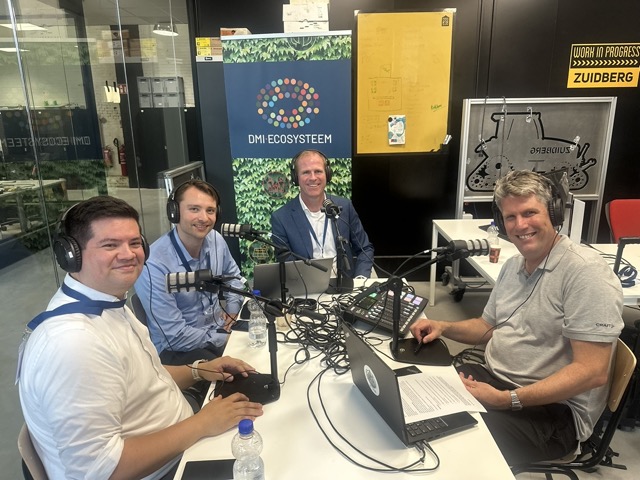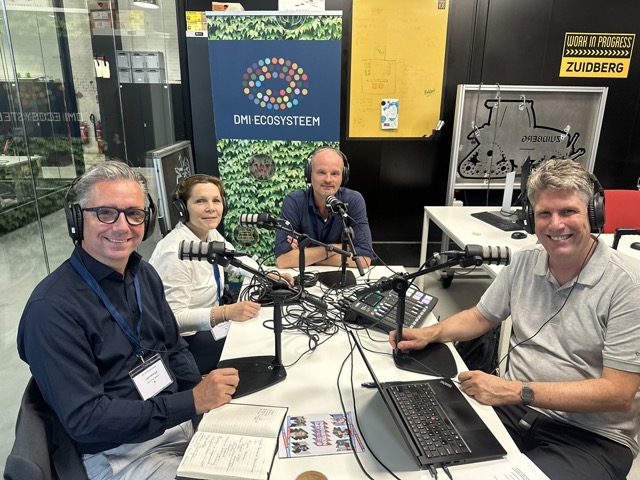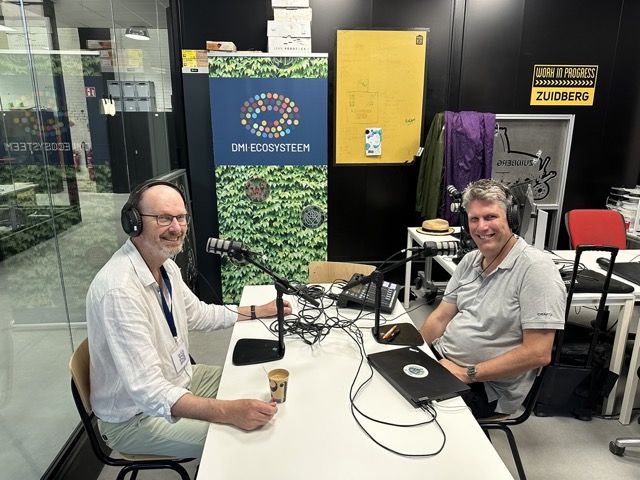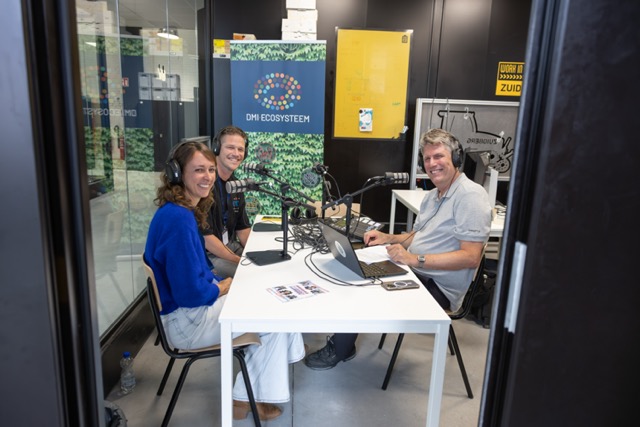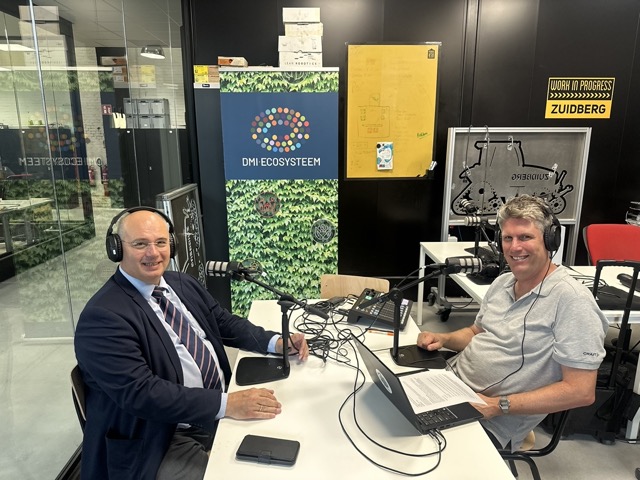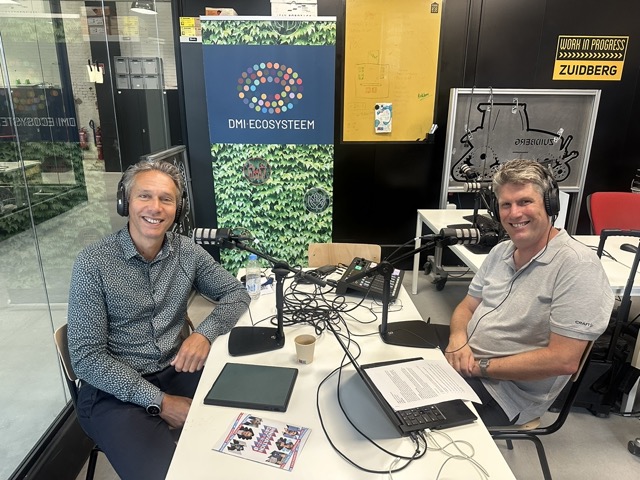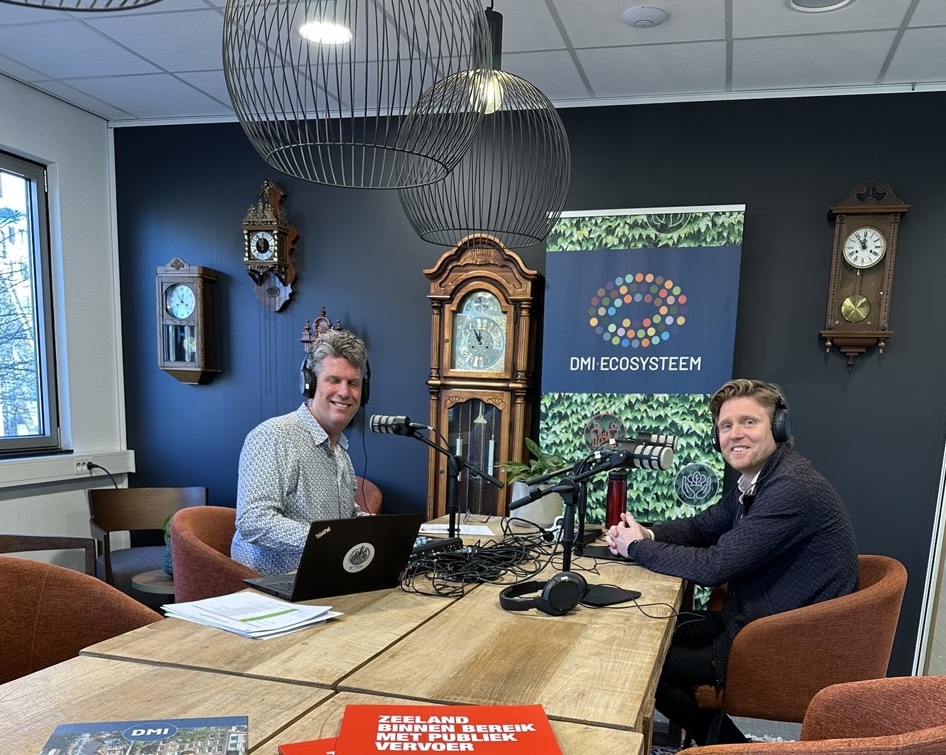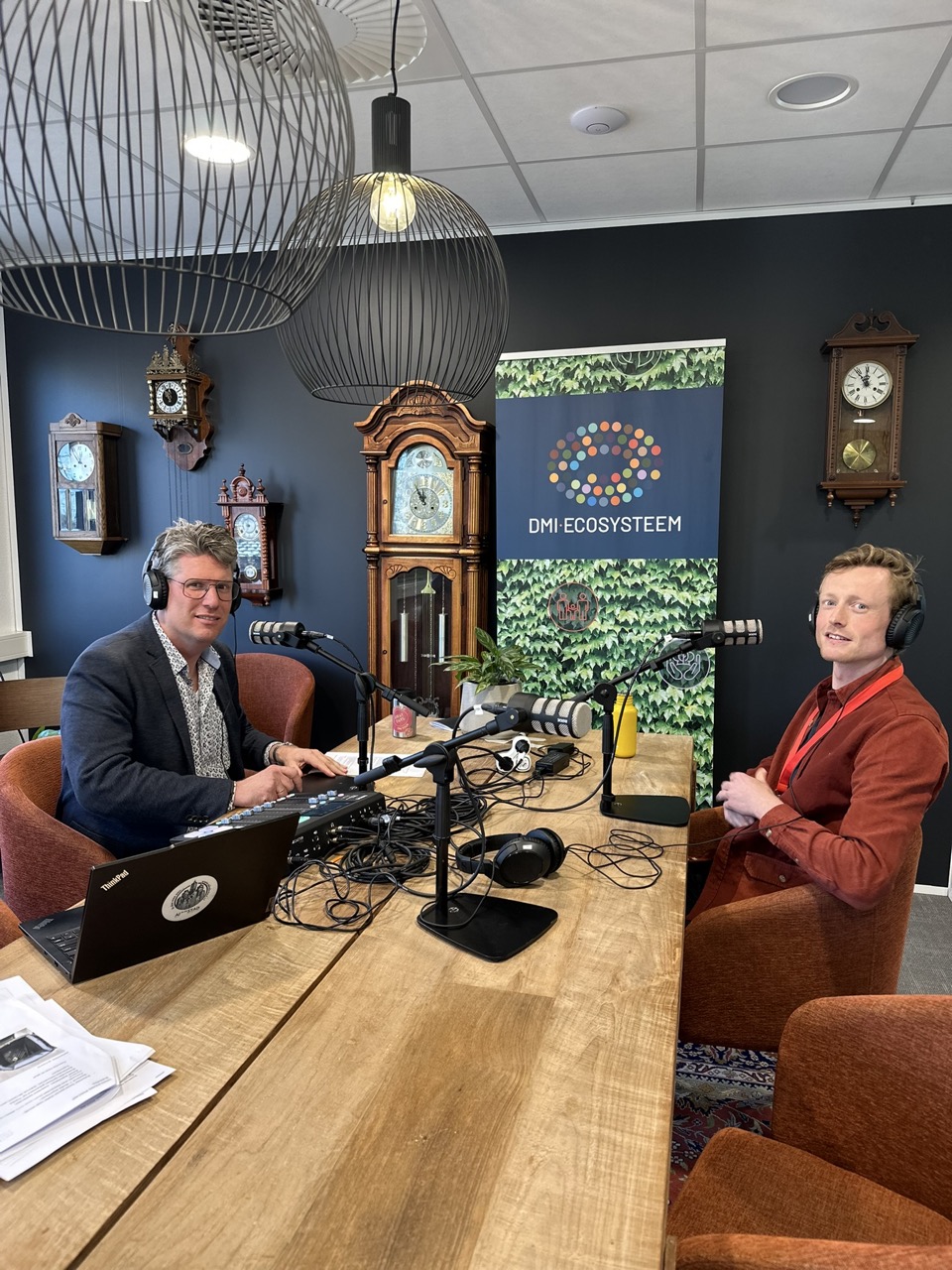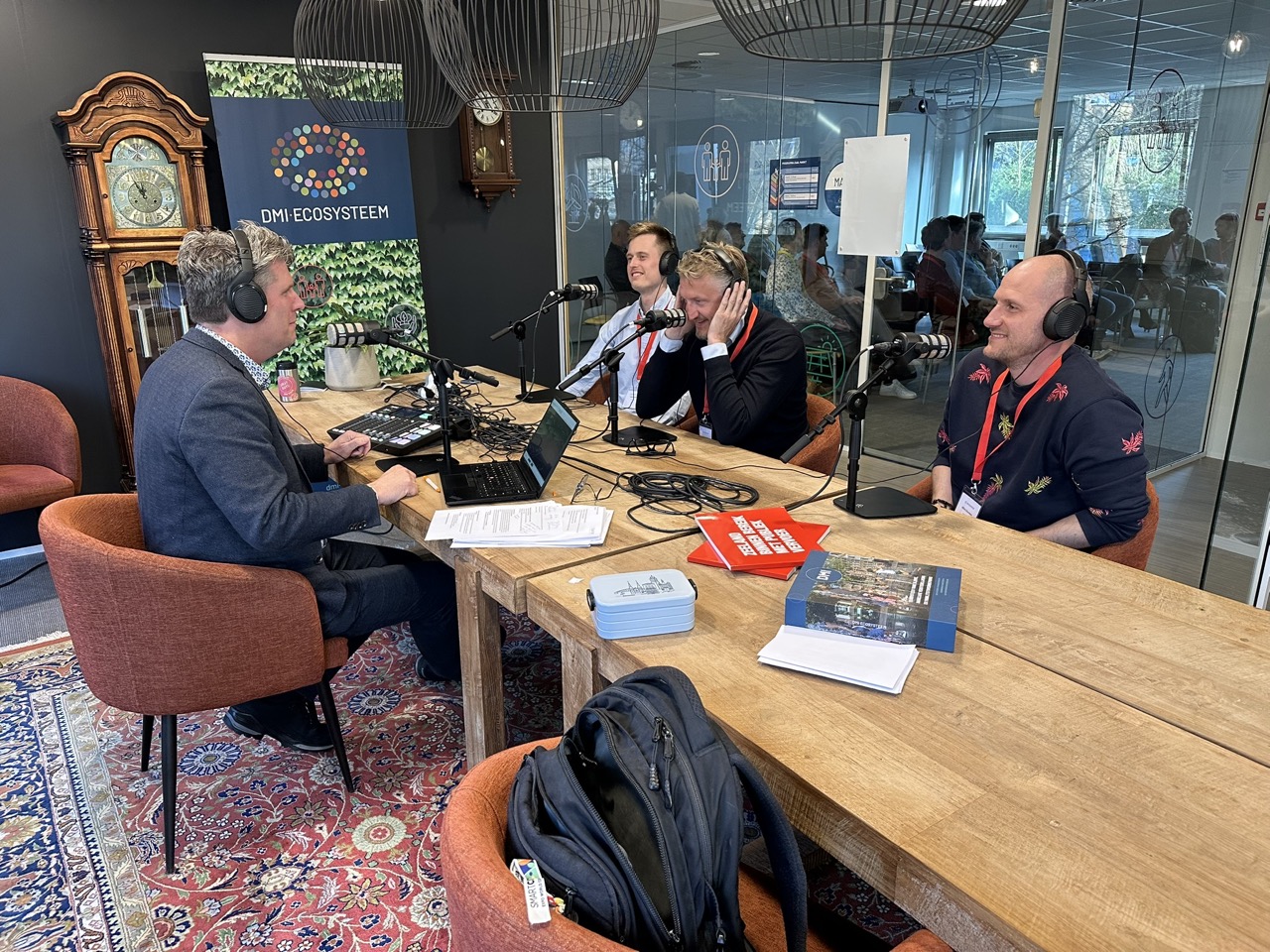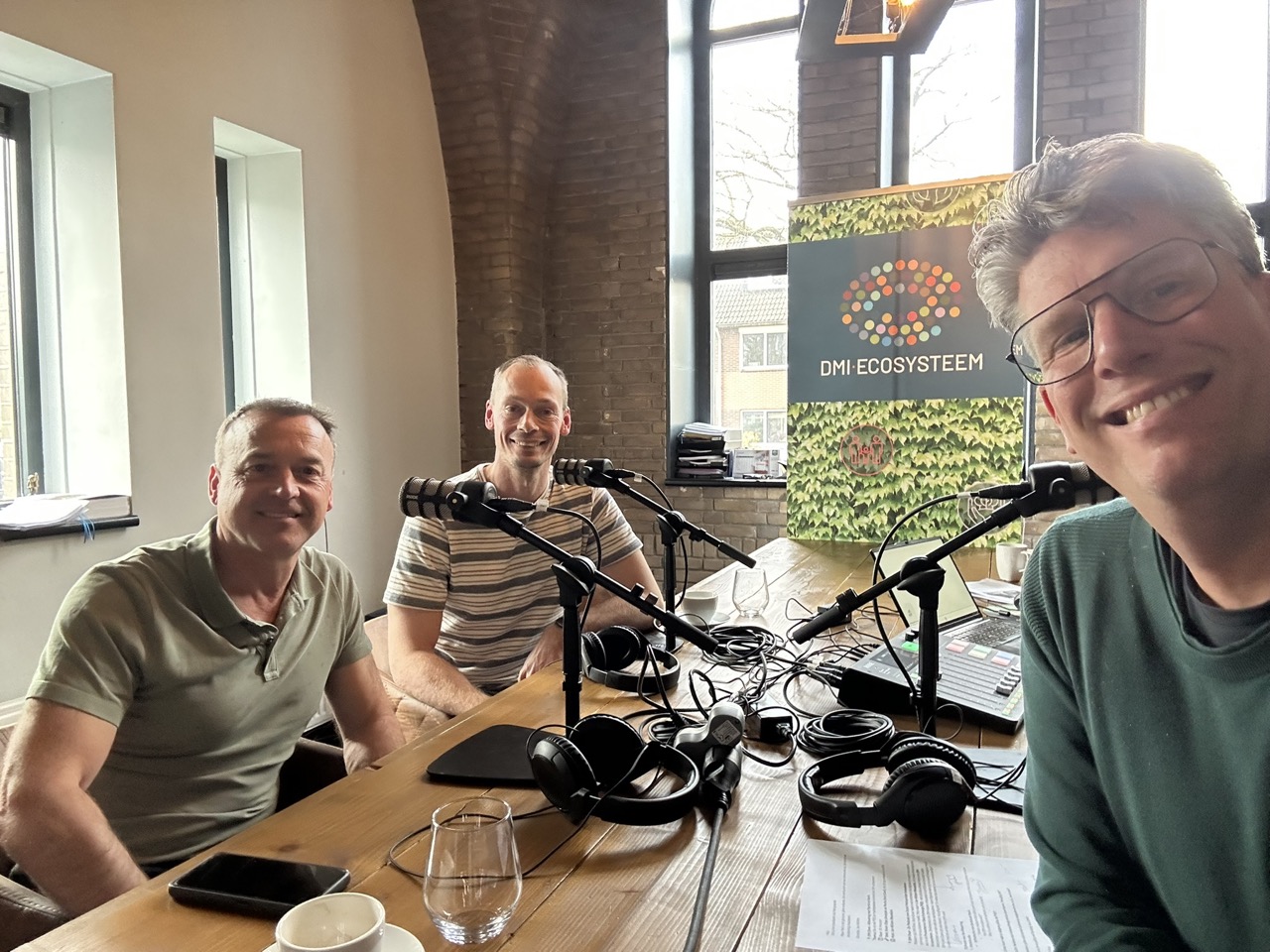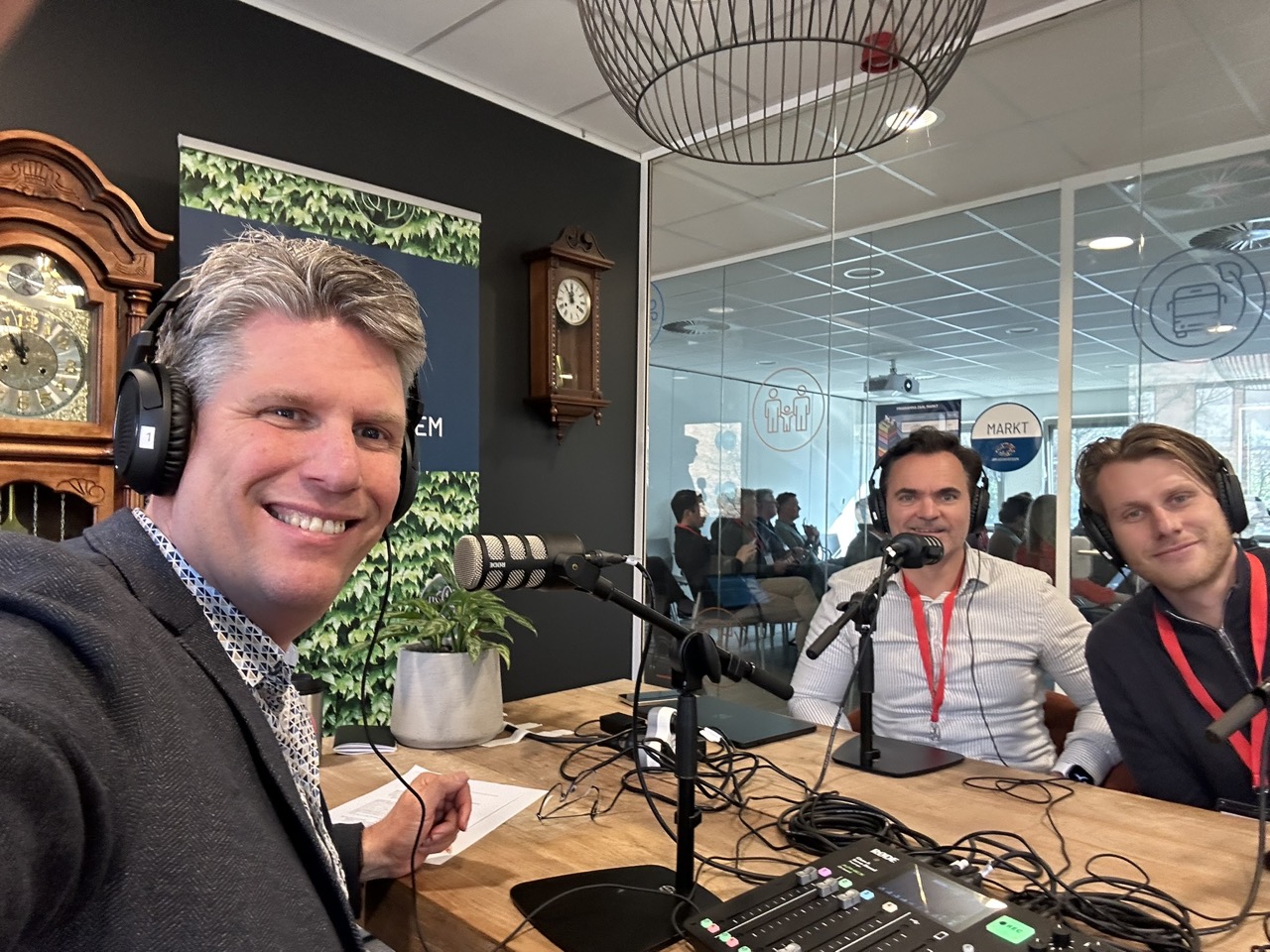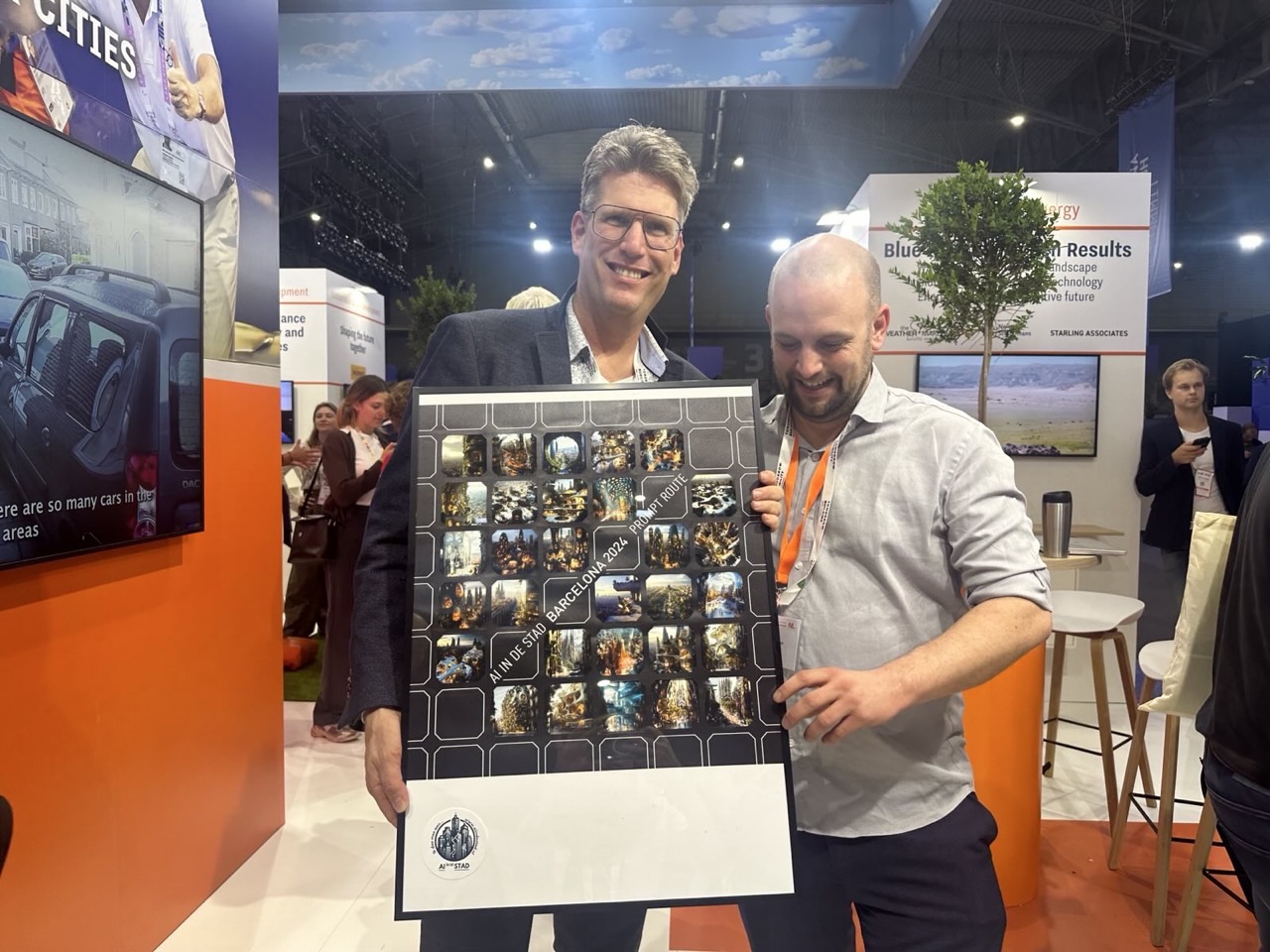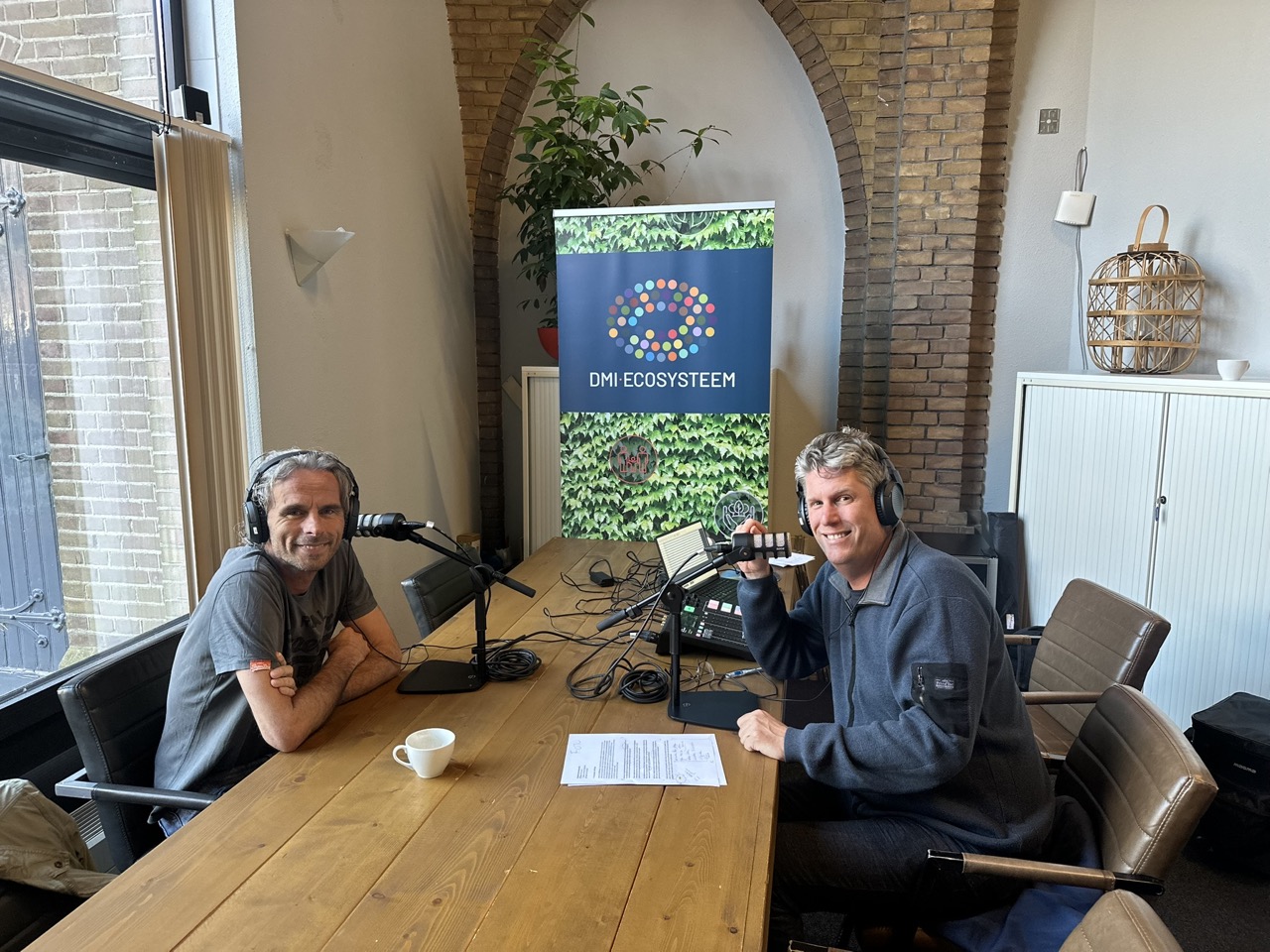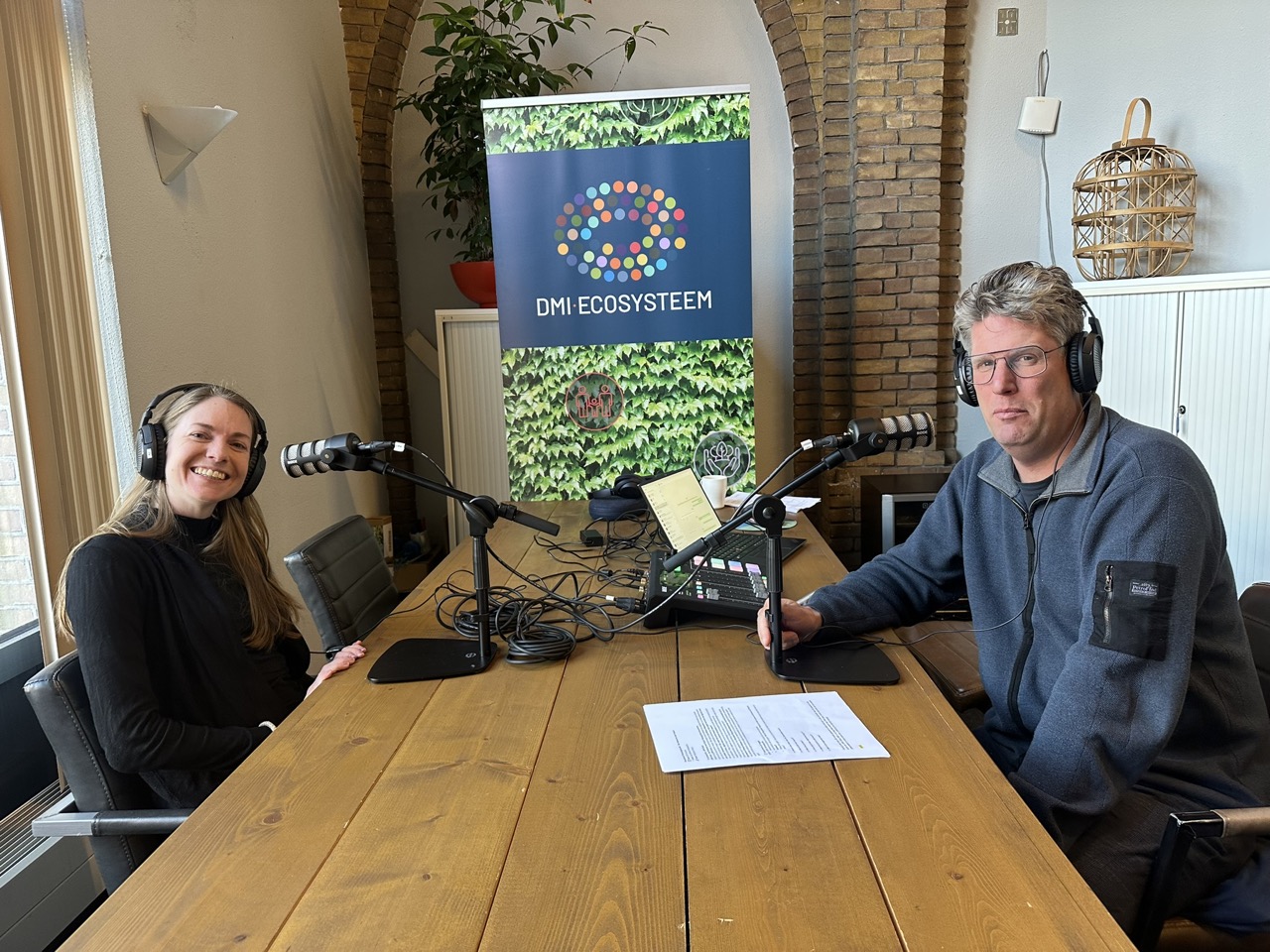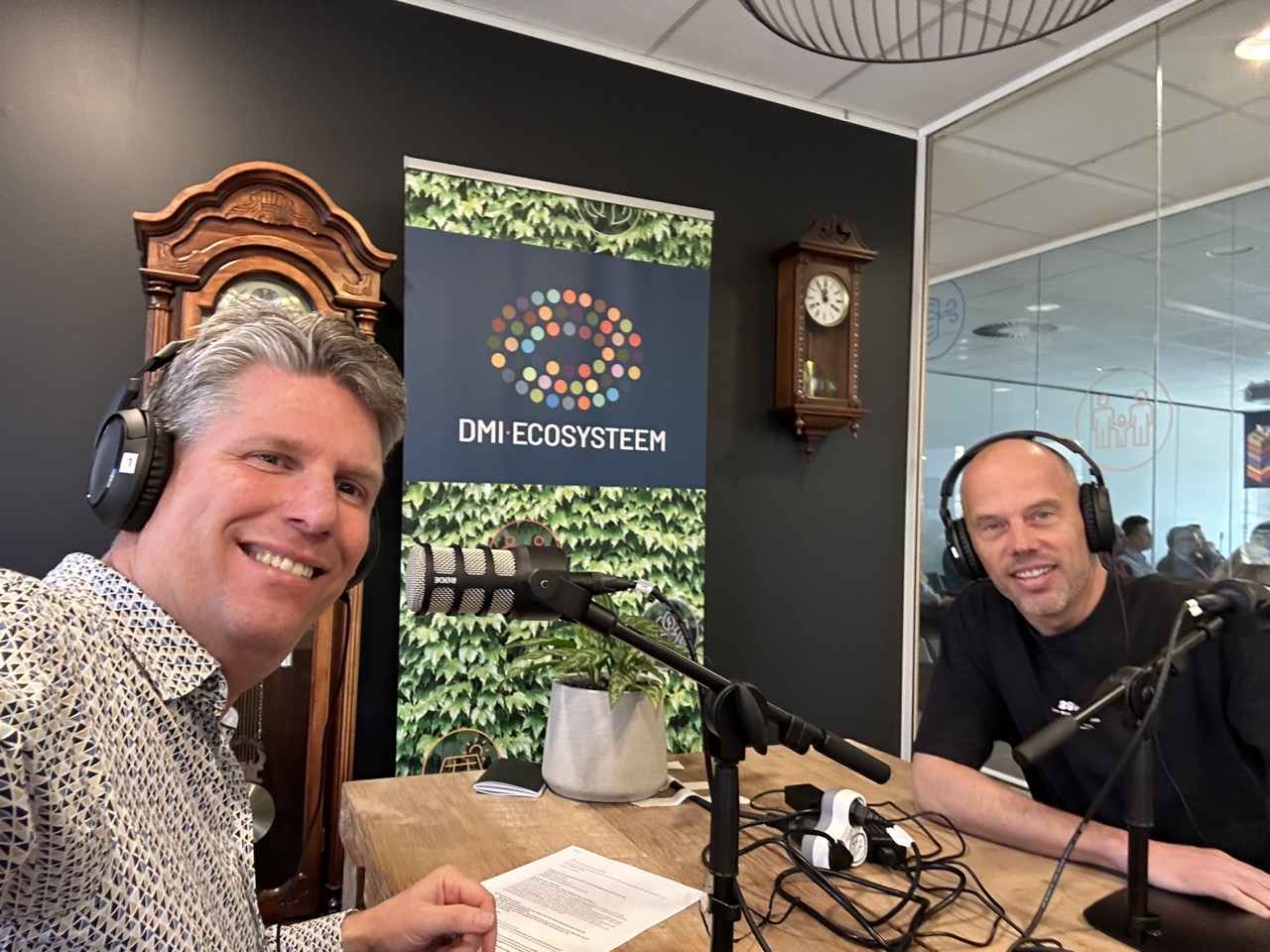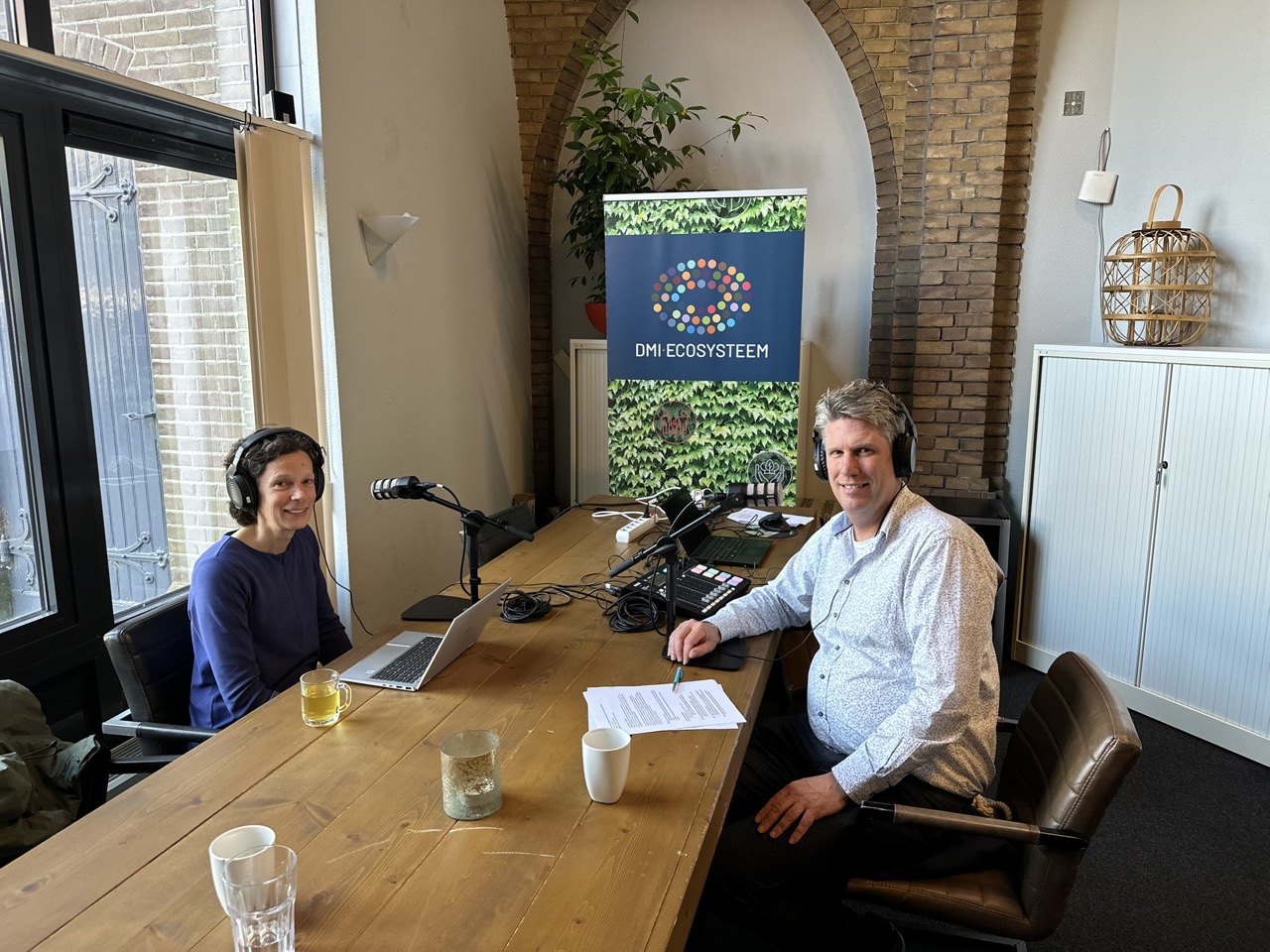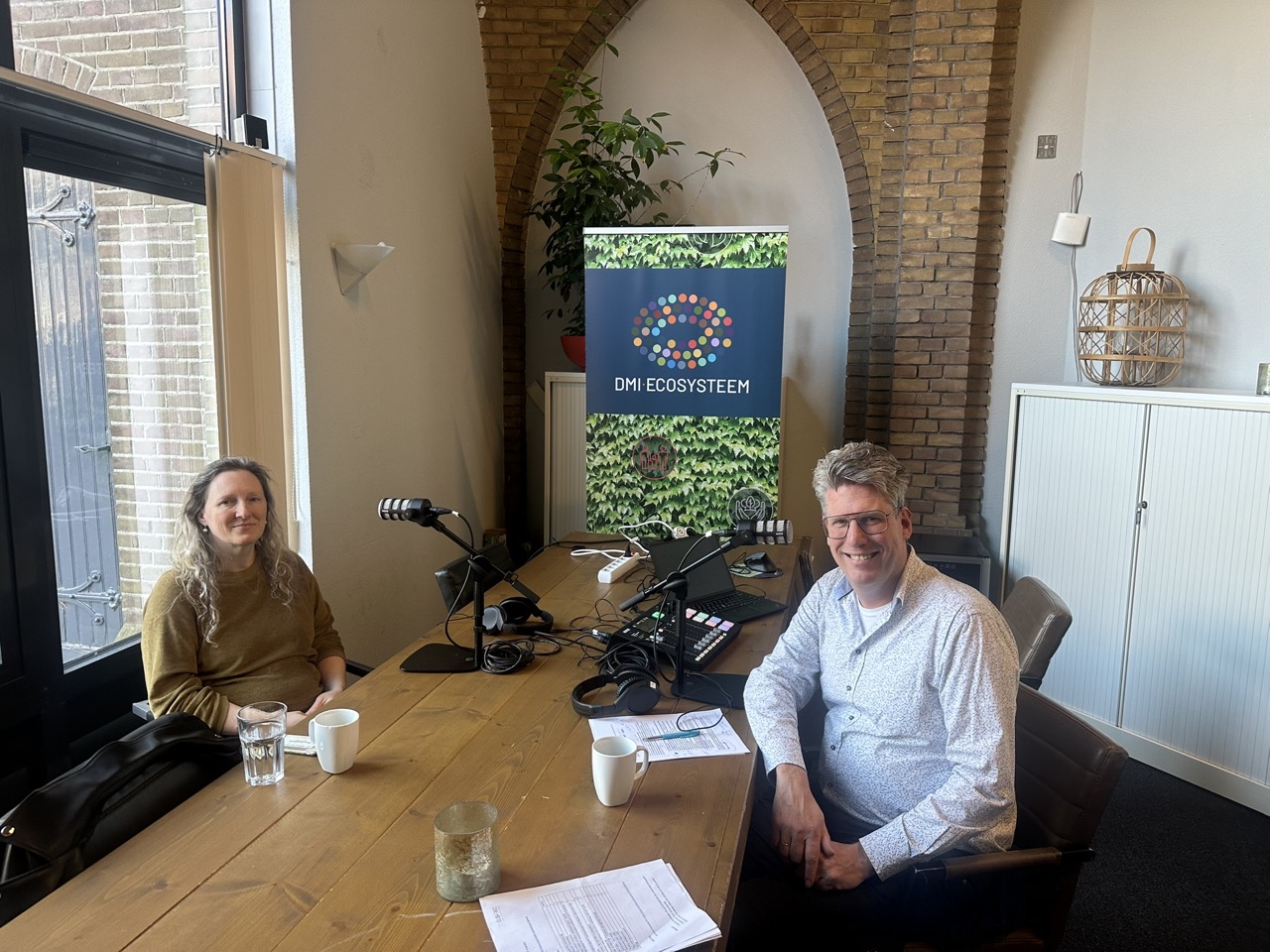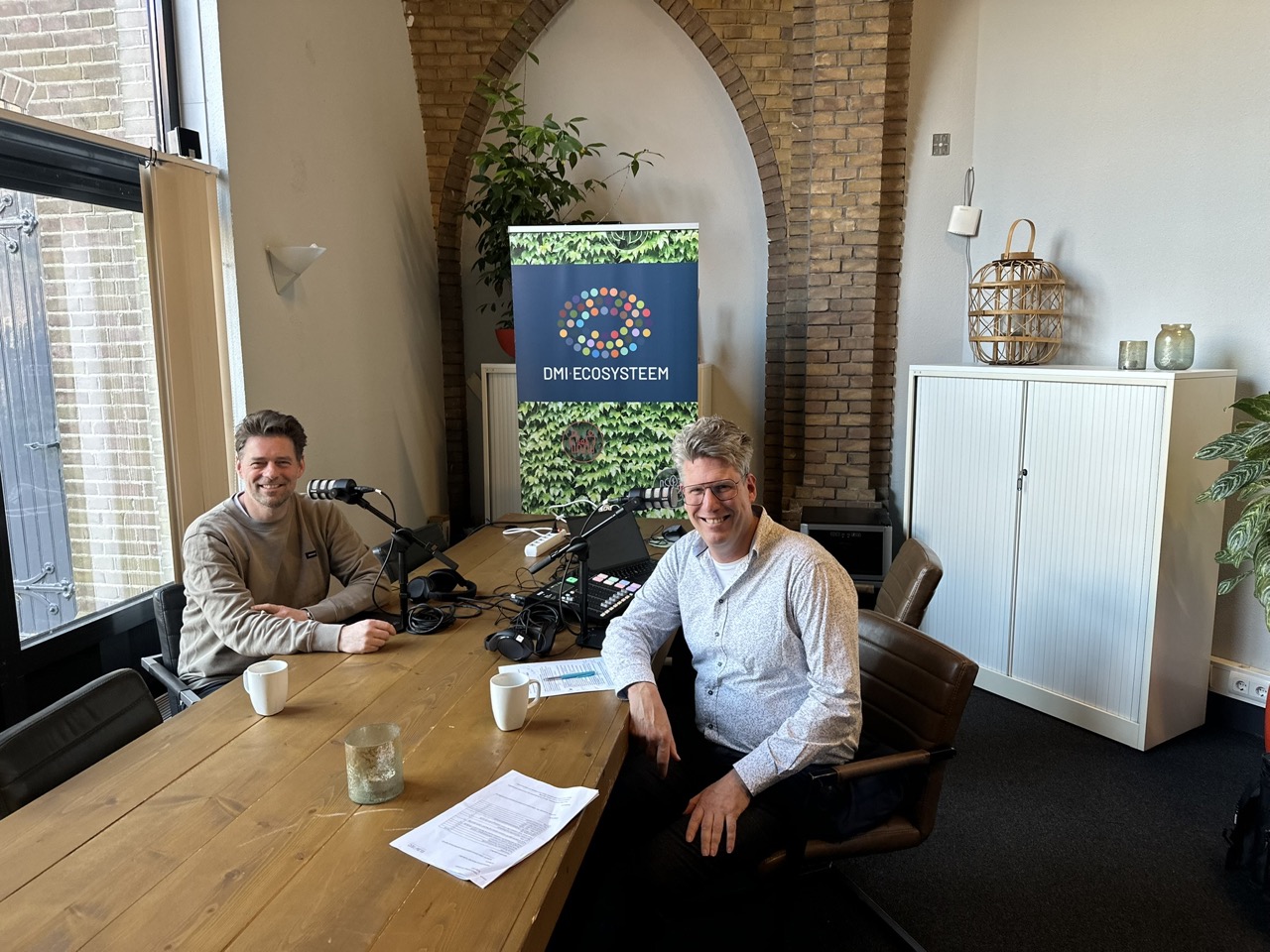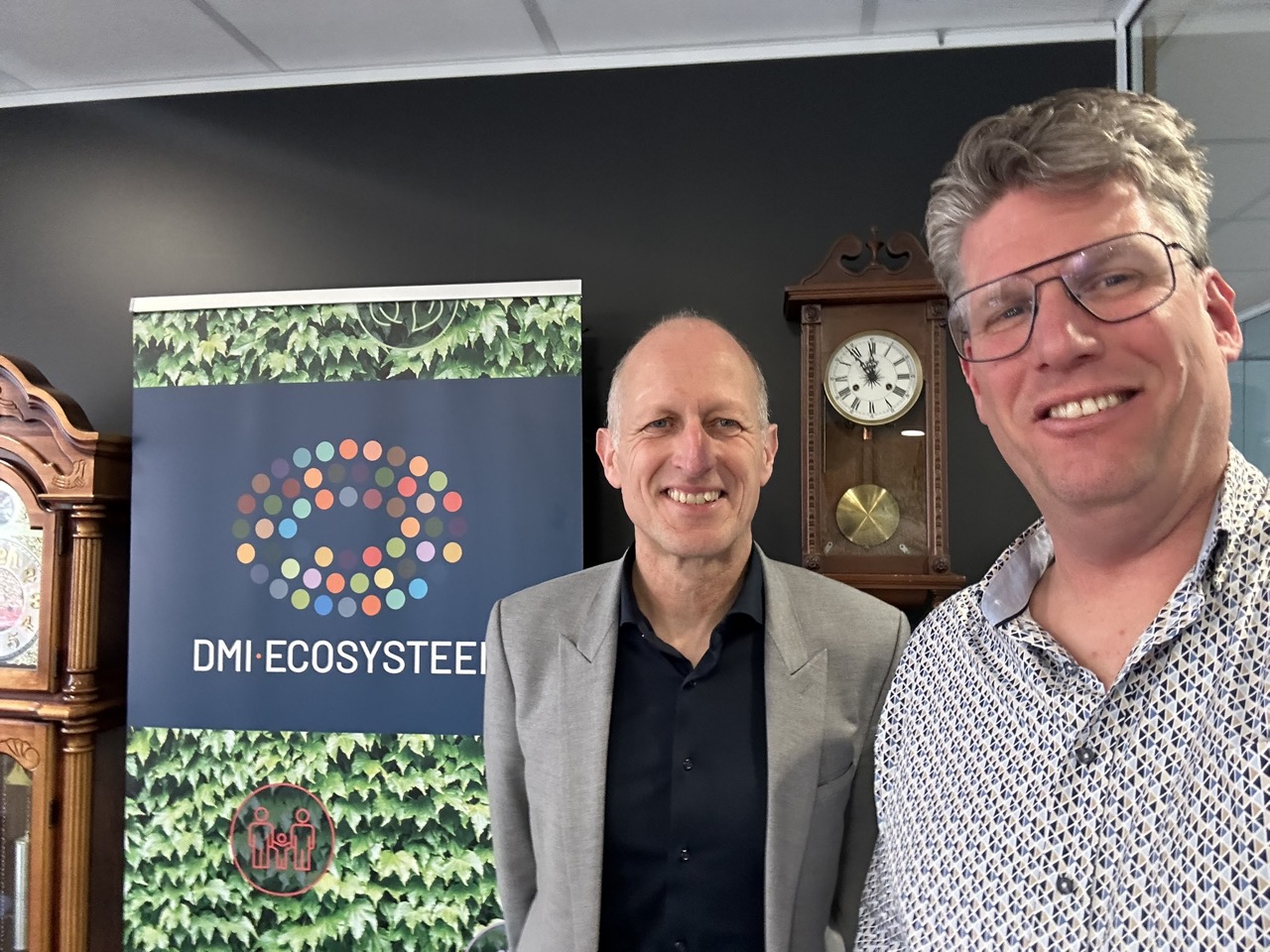Podcasts
Het DMI-ecosysteem lanceert een eigen podcast. Sinds medio maart hebben we al 13 afleveringen opgenomen van de nieuwe podcastserie DMI-Doet. In “DMI Doet” gaan we in gesprek met DMI-deelnemers op zoek naar concrete voorbeelden van hoe digitale innovaties helpen onze steden slimmer en duurzamer te maken


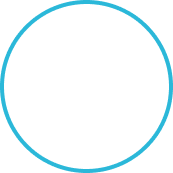
- Alle
- Gebiedsontwikkeling
- Inwonerparticipatie
- DMI toegepast
- Over innovatie
- Dit is DMI
- PDX en commons
#19 Bob Beelen, Oscar Willems en Luc van Loo brengen SAIL Amsterdam met data in kaart
Hoe houd je 2,5 miljoen bezoekers veilig tijdens een gigantisch evenement als SAIL Amsterdam? In deze aflevering van DMI Doet vertellen Bob Beelen (KPN), Oscar Willems (Avineon Tensing) en Luc van Loo (Analyze) hoe zij met data, modellen en slimme samenwerking SAIL letterlijk en figuurlijk in kaart brengen. Van hittestress tot crowd control – luister hoe samenwerking op het gebied van data de stad helpt sturen.
#18 Joost de Kruijf, Margriet Heesels en Martijn Geervliet digital twinnen met fietsdata: fietsvriendelijker, veiliger en mooier Breda
Joost de Kruijf (SmartwayZ), Margriet Heessels (Bredata) en Martijn Geervliet (Gemeente Breda) bouwen samen aan een Digital Twin in Breda op basis van fietsdata uit de stad. In deze aflevering van DMI Doet vertellen ze over de lessen die ze uit deze uitdaging trekken. Wat doe je bijvoorbeeld als je te horen krijgt dat data niet klopt? Daarnaast vertellen ze wat de Digital Twin in de praktijk oplevert. Luister mee en ontdek wat Breda doet.
#17 Syb Tkepkema werkt datagedreven met oog voor de wijk
Het Zwolse Assendorp is een karakteristieke vooroorlogse wijk, ooit gebouwd voor arbeiders van de Nederlandse Spoorwegen. Inmiddels is het uitgegroeid tot een levendige en diverse plek – geliefd onder Zwollenaren. Wel kampt de wijk met uitdagingen als wateroverlast, hittestress en parkeerdruk. Syb Tjepkema, senior beleidsadviseur mobiliteit bij de Gemeente Zwolle, zet zich dagelijks in voor het verbeteren van Assendorp.
#16 Evelyne Deceur en Dennis Martens herijken hoe we naar kwetsbare wijken kijken
Hoe kun je data inzetten om grip te krijgen in kwetsbare wijken? In deze aflevering van DMI Doet delen Evelyne Deceur (stad Gent) en Dennis Martens (Nationaal Programma Heerlen-Noord) hoe ze met data en mensenkennis bouwen aan sterkere wijken. Het gesprek gaat onder andere over luisteren naar bewoners, de kracht van professionals en waarom simpele oplossingen niet altijd eenvoudig zijn. Pas als data en praktijk elkaar vinden, ontstaat er ruimte voor vooruitgang.
#15 Martin Peersmann maakt de ondergrond inzichtelijk
Martin Peersmann is programmamanager Basisregistratie Ondergrond bij het Ministerie van Volkshuisvesting en Ruimtelijke Ordening. Hij neemt je mee in een voor velen onbekende wereld: de ondergrond. Martin laat zien hoe we in de loop der tijd steeds verder vervreemd zijn geraakt van wat er onder onze voeten ligt. Of het nu gaat om woningbouw, het aanleggen van riolering, het verzwaren van elektriciteits- en internetnetwerken of het vervangen van het gasnet door een warmtenet – de Basisregistratie Ondergrond is onmisbaar.
#14 Joost de Bruijn werkt met mobiliteitsdata aan integrale gebiedsontwikkeling
Hoe zorg je ervoor dat specialisten verder kijken dan hun eigen vakgebied – en een integrale aanpak het belangrijkst gaan vinden? Joost de Bruijn is programmadirecteur bij Goudappel. Hij wil inzichten uit mobiliteitsdata beter benutten voor bredere integrale gebiedsontwikkeling. Dat vraagt om een stap naar buiten, voorbij de grenzen van het eigen domein. Joost deelt zijn ervaringen, uitdagingen en laat zien hoe data én het DMI-ecosysteem bijdragen aan een aanpak die verder reikt dan mobiliteit alleen.
#13 Dennis Groot bouwt de PDX voor DMI en vertelt hoe het werkt
In this episode of DMI Doet we dive into the Products and Data Exchange (PDX) with Dennis Groot of AMS-IX, a crucial link within the DMI ecosystem. How does the PDX ensure that organizations can safely and efficiently exchange data, services and products with each other? And what role do marketplaces play in this?
#12: Thomas Lier werd Deelnemer bij DMI en plaatste direct zijn common op de marktplaats
In this episode of DMI Doet, Thomas Lier (product manager at Esri Netherlands) tells how he placed commons on one of the marketplaces within the DMI ecosystem. He looks back on the process and indicates what opportunities he sees within the DMI ecosystem.
#11: Johan Huiberts, Rik de Meij en Jeffrey Schuurmans hebben hun common op de marktplaats staan
In this episode of DMI Doet, Johan Huiberts, Rik de Meij and Jeffrey Schuurmans of Novis & De Meij tell us which commons they have placed on one of the marketplaces within the DMI ecosystem. And they take us to the Amsterdam Zuidas, what their common is about. Walking through the area, we discover how the work of the engineering firm has changed.
#10: Kevin Otjes en Martin Smit zijn onboarded bij DMI en vertellen wat dat opleverde
DMI participants must first register with the PDX before they can actively participate in one of the marketplaces. Kevin Otjes (Analyze) and Martin Smit (Caeli) are already there. In this episode of DMI Doet they explain how that went for them. They also tell how they got to know each other within the DMI ecosystem and how that collaboration leads to business success.
#9: Johan Posseth en Tom Griffioen leerden elkaar kennen bij DMI en werken nu samen
Johan Posseth (Kurtosis) and Tom Griffioen (Clappform) explain in this episode of DMI Does what the DMI ecosystem network can lead to. They were connected by DMI and discovered that they strengthened each other because the data of one improves the analysis of the other. Listen to this special story in DMI Does.
#8: Lars van Vianen maakt wat er nog niet is en past dat toe in de stad
Lars van Vianen (Starling) sees a challenge for artists and designers to create what does not yet exist. In this episode of DMI Doet we translate that to area development. How does innovation get off the ground and do we take the right starting point? Lars advocates a creative, concrete way of working.
#7: Rick Klooster leert dat organisaties vanuit een datafundament werken en ziet wat dat oplevert
In this episode of DMI Doet, Rick Klooster of Future Insight explains how much profit can be achieved if area development is based on a shared database instead of sending PDFs by e-mail. It leads to more efficient processes, fewer errors and better planning. Technically it has been possible for years, now it still has to be.
#6: Marjolein Pauly maakt de Zeeheldenbuurt in geleen op een slimme manier toekomstbestendig
In the Zeeheldenbuurt in Sittard-Geleen, Marjolein Pauly (policy advisor Spatial Planning & Innovation at the municipality of Sittard-Geleen) experiments with digital tools to make the neighborhood more sustainable and to involve residents. And with success. In this episode of DMI Doet she shares her lessons, for example that residents like to participate if they can translate that to their own interests.
#5: Frank van Ballegooyen laat inwoners op een slimme manier participeren
Frank van Ballegooyen is director-owner of Smarticipatie. This company helps residents gain more influence on the design of their living environment. With data and digital tools, participation processes run faster, more effectively and offer more insight into changes. In this episode of DMI Doet we learn more about smart participation.
#4: Heidy Smit bouwt 5000 woningen in Amersfoort en dat kan alleen met een goede informatiehuishouding
De gemeente Amersfoort staat de komende jaren voor een enorme stedenbouwkundige opgave: er worden vele duizenden woningen gebouwd in de bestaande stad. Dat lukt alleen als je je goed voorbereidt, je informatiehuishouding op orde hebt en van daaruit aan de slag gaat. Dat doet Heidy Smit (Strateeg Ruimtelijke Ontwikkeling bij de gemeente Amersfoort) en in deze aflevering van DMI Doet legt ze uit hoe.
#3: Elena Chevtchenko hackt het ontwerpvak en vindt gelijkgestemden bij DMI
Elena Chevtchenko van Posad Maxwan noemt zichzelf een hacker in de ruimtelijke ordening. Ze heeft altijd al met data gewerkt, de basis van planning. Ze ziet dat dit leidt tot betere plannen. In het DMI-ecosysteem vindt ze gelijkgestemden en ziet ze de kans voor een enorme sprong voorwaarts. Leer het in DMI Does.
#2: Michiel Oomen vindt de ruimtelijke ordening opnieuw uit en ziet wat dat Eindhoven oplevert
Michiel Oomen werkt al jaren datagedreven bij de gemeente Eindhoven. In deze aflevering van DMI Doet noemt hij het “Urban Planning Reimagined”, of in alledaags Nederlands: ruimtelijke planning anno nu. En dat een gemeente als Eindhoven koploper is op dit gebied, is niet alleen logisch voor de hoofdstad van Brainport, het is ook de enige manier om de grote uitdagingen van vandaag op te lossen.
#1: Annius Hoornstra ziet hoe gebiedsontwikkeling verandert en welke rol data en informatie daarin spelen
Annius Hoornstra (ThePositiveLab) werkt al zijn hele leven in de gebiedsontwikkeling, maar hij heeft het vak nog nooit zo snel zien veranderen. Beetje bij beetje ontstaat er een nieuw businessmodel waarin andere vragen en waarden gelden. Om dit goed te kunnen doorrekenen, heb je inzicht en dus informatie en data nodig. Daarover gaat deze aflevering van DMI Doet.
